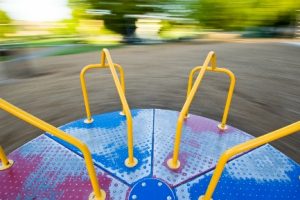This course was created out of frustration with the way children respond to traditional vestibular rehabilitation. Children are not “just smaller adults” and they have unique presentations and responses to intervention. Current literature finds that children have similar rates of vestibular dysfunction as adults. This has created the need for specialization intervention.
This course will present the current understanding of the scope of the problem, best practice, systematic evaluation and treatments to address vestibular deficits in the school-aged child and adolescent. The course combines lecture, hands-on lab, and case study to accurately and efficiently address dysfunction. This course is updated as new information and guidelines are published. The primary goal is to challenge therapists to re-think movement and stillness in their practice, using a comprehensive understanding of the vestibular system. Principles presented can be applied across the lifespan and with a multitude of disability levels.
Course Objectives:
After completing this course the participants will be able to:
- Describe developmental anatomy and physiology related to the vestibular system, including related reflexes, and balance.
- Choose the most relevant, time efficient evaluations specific to functional deficits and be able to take these findings to create and modify a treatment program.
- Recognize dysfunction that can be addressed and red flags that signal the need to referral to other medical providers
- Be able to educate patients, caregivers and other medical team members about the identified vestibular involvement in the child’s functional complaints
Inger Brueckner, MS, PT, has practiced vestibular rehabilitation since 1994. She began teaching after completing the Emory University/APTA Vestibular Competency course in 2003. In 2010 she joined the Rocky Mountain Hospital for Children Center for Concussion as the creator and director of PACER (Progressive Acute Concussion Exertional Rehabilitation). She is a member of a multi-disciplinary team focused on providing cutting-edge, effective, safe rehabilitation. Working for Presbyterian/St. Luke’s Medical Center in Denver, CO, she has presented research findings at APTA CSM, published journal article, book chapter, developed protocols, and been invited to speak at international, national, and local conferences. She is passionate about providing the best care for all patients in a collaborative medical team, sharing lessons learned through continuing education.
Additionally, Inger Brueckner is the principle physical therapist treating limb loss at Presbyterian/St. Luke’s Medical Center. Her experience spans many age groups, causes and levels of limb loss and amputee working in a multidisciplinary team dedicated to the advancement of function in this population. With a master’s in PT, Inger has worked primarily as an outpatient therapist and hospital-based outpatient center. She co-authored an article on pre-prosthetic training and has presented at national and international conferences.
VENUE ADDRESS
Gardenview Medical Building
347 North Smith Ave.
St. Paul, MN 55102
Directions
SUGGESTED ACCOMMODATION
St. Paul Hotel
350 Market Street
St. Paul, MN 55102
Directions
VENUE LOCATION MAP
Click image to access Google Maps.
This course meets the criteria for 14.5 contact hours (1.45 CEUs). TX Physical Therapy Association accredited provider.
This course meets the approval for type 2 CEUs by the TX Board of OT Examiners.
Approved provider of continuing educationby the American Occupational Therapy Association #3043 for 14.5 contact hours (1.45CEU's) - Intermediate level. Occupational Therapy Process: assessment, Intervention.The assignment of AOTA CEU's does not imply endorsement of specific course content, products or clinical procedures by AOTA.
NBCOT professional development provider - 14.5 PDUs


